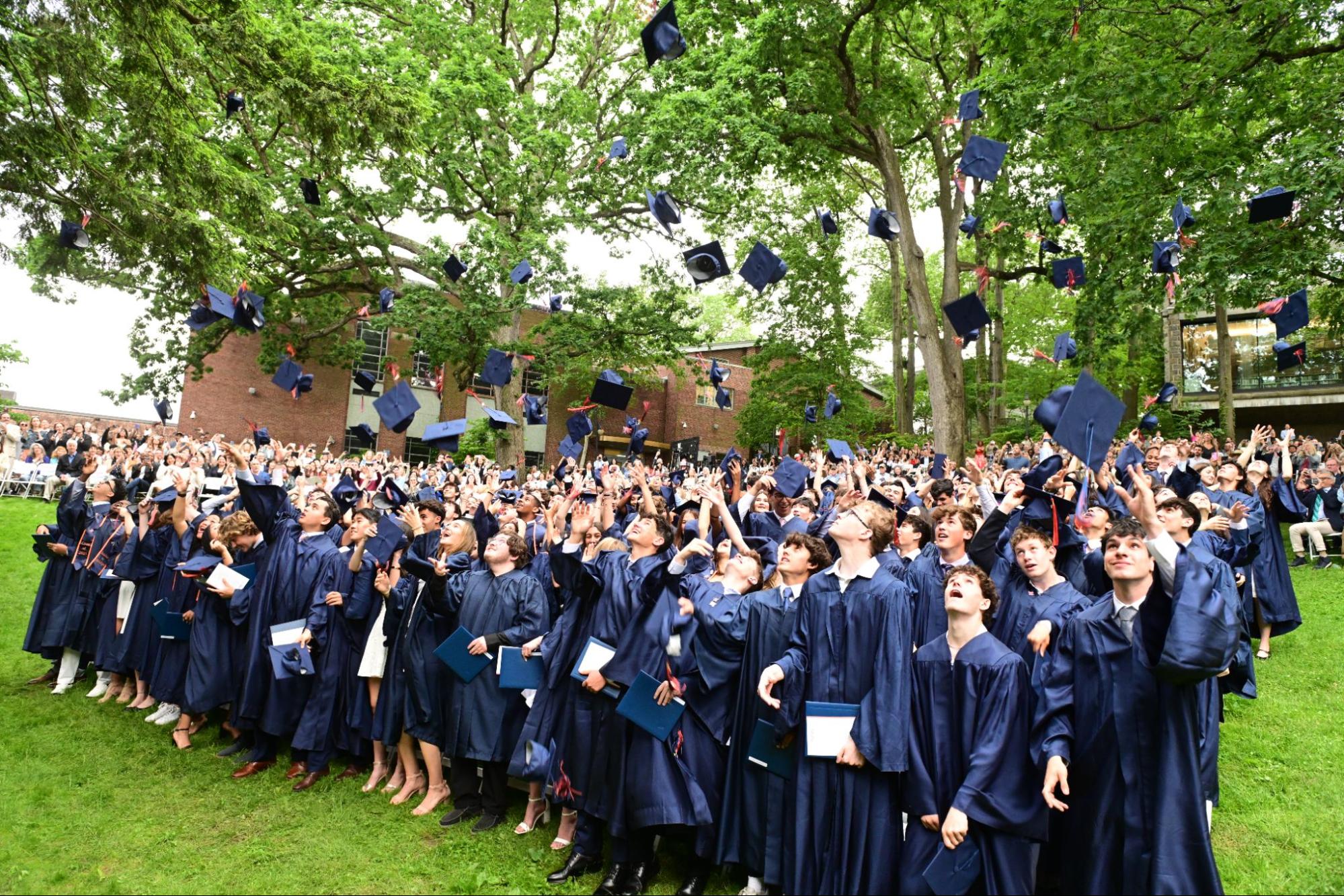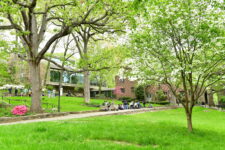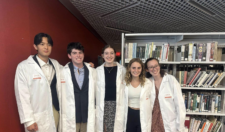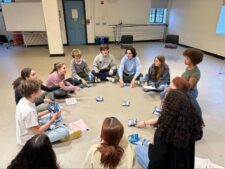In the last week of May, the Ethical Culture Fieldston School community gathered to celebrate the achievements of the Class of 2025 at Commencement. As is tradition, three student speakers offered remarks on their time at ECFS, reminiscing on memories that spanned from their first moments at ECFS fourteen years ago through their final weeks as seniors. Following our students, keynote speaker Kenneth I. Chenault spoke about the essential ethical education ECFS provides, and the way it both empowers and challenges our students to step into the world guided by a strong inner compass. Keep reading for all four speeches, and congratulations to the Class of 2025!
Reanna Bilbao
Hello Fieldston administration, faculty, families, friends, and to the Class of 2025, “How you doin’?” You all look incredible, and even if you don’t, it’s okay because I’m not wearing my glasses right now. It is an honor to speak in front of you all today and I’m incredibly grateful to do so. Thank you to my peers and to my 30 plus personal Google accounts I used to vote for myself as speaker. Just kidding!
When writing this speech, I couldn’t stop thinking about a class I had this year led by a substitute teacher who is also a former radio show host. One of my peers asked, “How do you keep an audience engaged?” to which he responded, “If you don’t capture your audience’s attention within the first two seconds, you’re going to lose them.” So, if I’ve already lost you, I’m sorry, because I still have about 37 more pages to go.
No matter how much time I spent taking notes on other commencement speeches, I was completely lost in writing this speech. I mean, how was I supposed to make a day intended to celebrate 152 other students about myself? After having done so at every school-wide event these past few years, I have finally decided I should probably share this moment with you all.
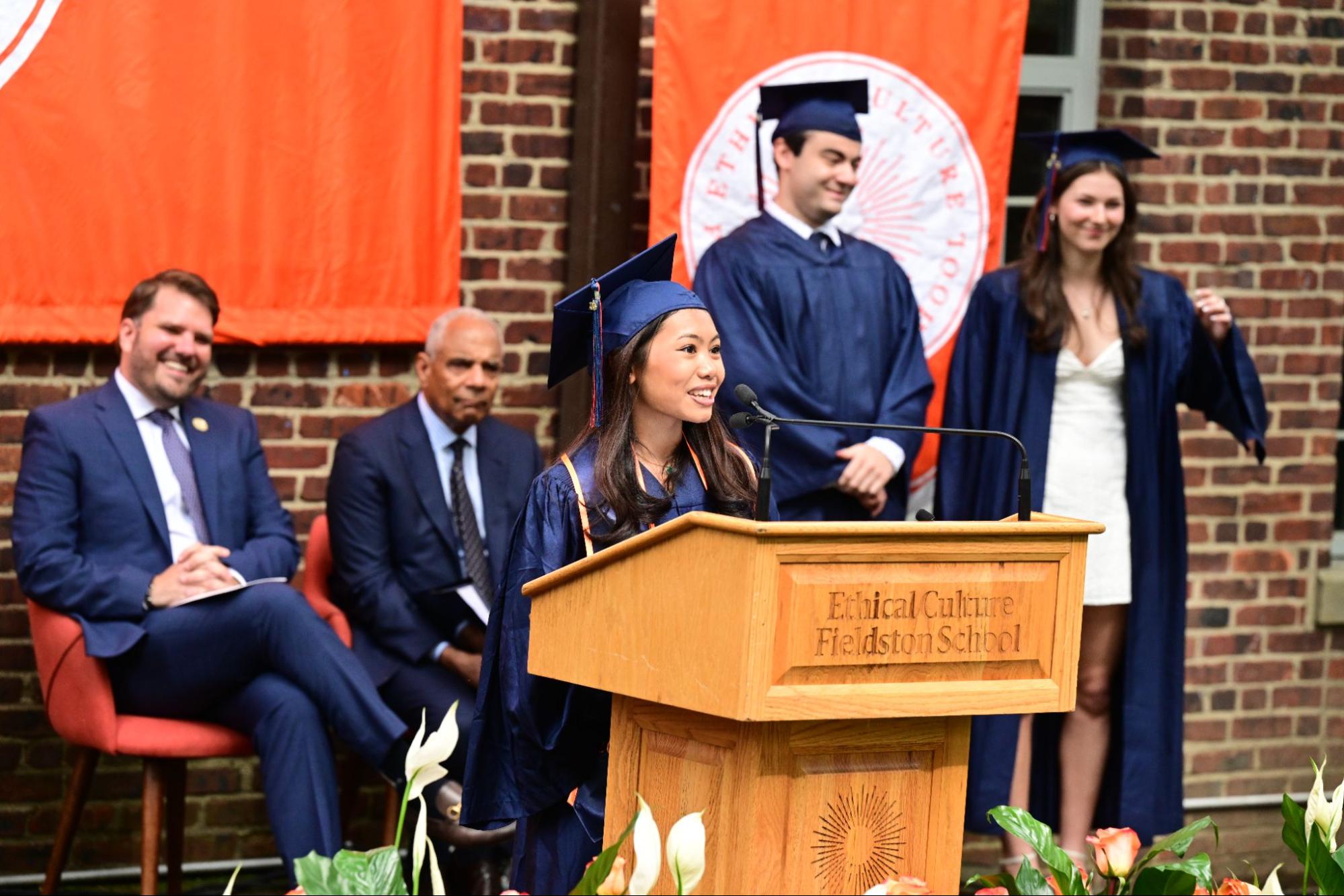
Within the past two years, I’ve had several opportunities to speak at a Fieldston podium. After each time, my main takeaway was wishing I had brought a stepstool. I’ve also noticed that the administration and my dean pray I don’t go off script when handed the microphone. Actually, one of the only guidelines for this speech was to stick to what I wrote, a challenge I’m not going to pretend that I want to follow, but I will comply with in the best interest of receiving a diploma. I also don’t want to get an “I’m not mad, just disappointed,” look from Dr. Bobo, and, after all we’ve put Dean Bucello through this year, I don’t want to give her any surprises in our last moments with her as our dean.
You may be wondering why I would even want to go off script. Throughout my time at Fieldston, I’ve learned that sticking to a script won’t capture complete authenticity or allow me to respond to the yawning in the audience. I know how ironic it is for me to be sharing this with you since I’m using a script. Bu t I’ve realized that the power of a message lies not just in words, but also in how they’re delivered.
After countless incredible quick thinking assembly speakers and countless experiences improvising speeches on my own. I’ve learned that going off script works when you’re prepared. And when you’re prepared, whether for a class presentation, concert, musical, or sports game, you perform confidently with confidence that is grounded in rigorous studies, hours of rehearsal and months of practice. Each of us here today has witnessed how thorough and diligent preparation transforms and moves audiences. Today we come together to celebrate how we, the Fieldston Class of 2025, have invested our unique and diverse talents into this community. And our community continues to thrive because of the opportunities we have been offered to share who we are with one another.
That is why, as we spend our last few moments as Fieldston students, I ask you to walk into the world without a script — because you all are prepared to. Our Fieldston education has readied us to face the questions, challenges, and opportunities that our world has to offer. I’m confident that we are all going to engage and captivate our future audiences with originality, passion, and purpose without having to hold a piece of paper to remind us what values and morals we hold.
In case you weren’t going to take the advice that I have so graciously shared with all of you, I called up my good friend Felix Adler for some words of wisdom to back me up — to which he offered no response. But, in the age of the internet, I was able to track down one of his many quotes. I guess he wasn’t that concerned about his digital footprint!
According to brainyquote.com, Felix Adler once said, “The freedom of thought is a sacred right of every individual man, and diversity will continue to increase with the progress, refinement and differentiation of the human intellect.” This quote emphasizes the need for free thinking, especially during times when that feels suppressed. So, if you’re not going to take my advice, I hope that you will take Felix Adler’s. Each of our strengths and approaches to problem solving is what will create change in the world, because that is what Fieldston students do. We create change. I mean, for example, now promposals have to be approved because students have been going all out. Let me say it again: students have been going all out! If you haven’t seen a Fieldston promposal, let me just say, damn, now I want to see what your marriage proposals are going to be like.
And honestly, I think that I can appreciate your efforts even more because at this point in the year, our inboxes were filled with emails with the subject, “Please complete all outstanding work,” and we were still getting warned about possibly being on the students of concern list. And everyone here is graduating, so, good job for multitasking, I guess.
Because you can multitask in the span of two weeks, I’m confident that you all will continue to make an impact on the world by changing it for the better beyond the Fieldston community, all without a script, because that is what we have been practicing and preparing to do. And do you want to know what I think about scripts? They’re only a safety option, something to fall back on. They don’t have the answers for everything. You won’t have a script to answer the unexpected challenges that life has to offer. Remember, it’s okay not to have all the answers — the truth is, you don’t, but you’re ready to learn them.
As we near the moment where we will be handed our diplomas and throw our caps in the air, we must recognize that we are prepared to leave Fieldston’s grounds ready to approach the world through taking action and expressing ourselves — even when comfort feels like the safer option. I encourage you to take that risk, go off script and change the world in ways that are new to you, and most importantly in ways that history asks you to.
Finally, I would like to dedicate the last part of my speech to thanking my family. I’m sorry this speech couldn’t be a surprise. I knew we wouldn’t be able to make it out of the house on time if I hadn’t told anyone, because running on Filipino time means the only place we’re early to is the airport. To my sister, who has dealt with people confusing us with one another for the past three years, thanks for begging the bus driver to wait for me in the mornings, and to my parents, salamat po. There is not a day that goes by where I do not think about the hard work that came before and after your journey from the Philippines to the United States, which has allowed me to stand here today. I’m so grateful for the sacrifices that you have made, even if that meant giving up your own personal dreams and goals so that I could achieve mine.
To the Class of 2025, I’m so grateful that we have experienced Fieldston together. We’ve seen almost every version of ourselves, and I can’t wait for you to vote for me as president in 17 years.
Thank you and congratulations!
Natalia Posen
Last Wednesday, the seniors who graduated from Ethical Culture revisited the building on Central Park West. We took a trip down memory lane, speaking with former teachers, enjoying a final meal in the cafeteria, and nostalgically roaming the playground on the roof. I especially loved looking back at our 5th Grade yearbook, in which we each designed one page and wrote a small blurb about our time at Ethical Culture. I started mine with: “I recently turned 11 and I’m excited for the years to come when I’m older than 11 too. Earlier in the year we read a story about when you are 11, you are also all the ages before 11. You are 1, 2, 3, 4, 5, 6, 7, 8, 9, 10, and 11 years old. You act like all of those ages. I think this is accurate.”
I still think this is accurate. But now that we’re seven years older, we get to act like a few more ages than just 11. As a senior class, I believe we are a mosaic of every age, every memory, and every interaction that we’ve experienced at Fieldston.
Even today, some of you are still the 5th Graders that spent your recesses making robots in Lan’s computer room, which led you to become the 9th Graders who brought AIM Robotics to Fieldston, forming the School’s very first robotics team. Some part of you are the 5th Graders who worked a bake sale to donate money to fight climate change, allowing you to be the 6th Graders who, dismayed that the Fieldston Tree logo was traded for a sun, created and signed petitions to revive it.
While our twelve-year-old activist effort was entirely unsuccessful, it laid the foundation for our seventeen-year-old activism, leading mental health clubs, organizing assemblies on climate awareness, and spearheading a Special Olympics event on campus. And of course, some of you are the same 3rd Graders who ran to Nurse Sue for imaginary headaches, preparing you to be the second semester seniors whose inbox is filled with “missing D band” emails from Sandra Wang.
Although we may still retain a part of our elementary school selves at heart, we have also grown immensely during our time at Fieldston. We have grown from being unruly STS students, annoyed at our leaders for telling us to focus, to now becoming those very leaders, frustrated that our students just won’t listen to us. We’ve grown closer together as a grade, forming lasting friendships with classmates we hardly knew only a couple years before. We’ve evolved past obsessions with toys like fidget spinners, trading them for a new toy — our phones, which, like fidget spinners, have also been banned from classrooms.
As much as we have been shaped by our positive memories, our mosaic has also been shaped by the obstacles that we’ve overcome. For example, we could only be the graduates we are today after overcoming embarrassing talent show performances, like my and Georgia’s 4th Grade rendition of “One Call Away” by Charlie Puth, which showed some of us that maybe we didn’t have a future in music, and maybe that’s okay. This taught us how to recognize our strengths and weaknesses, which we carried on through high school, helping us choose whether to be an art major, varsity athlete, actor, or all of the above. We persevered through a four hour long river rafting trip without a wave (or end) in sight. This taught us to push through the hard moments, even when we have no clue when it will get easier. We suffered tragic Splashin’ eliminations after forgetting to wear our goggles or floaties. This taught us to always be prepared, because you never know what life will throw at you. When faced with the sad reality that it was our final day of classes at Fieldston, we pushed our lunch tables together to enjoy (our own version of) the last supper. This taught us that we can always make the best of any moment, no matter how sad.
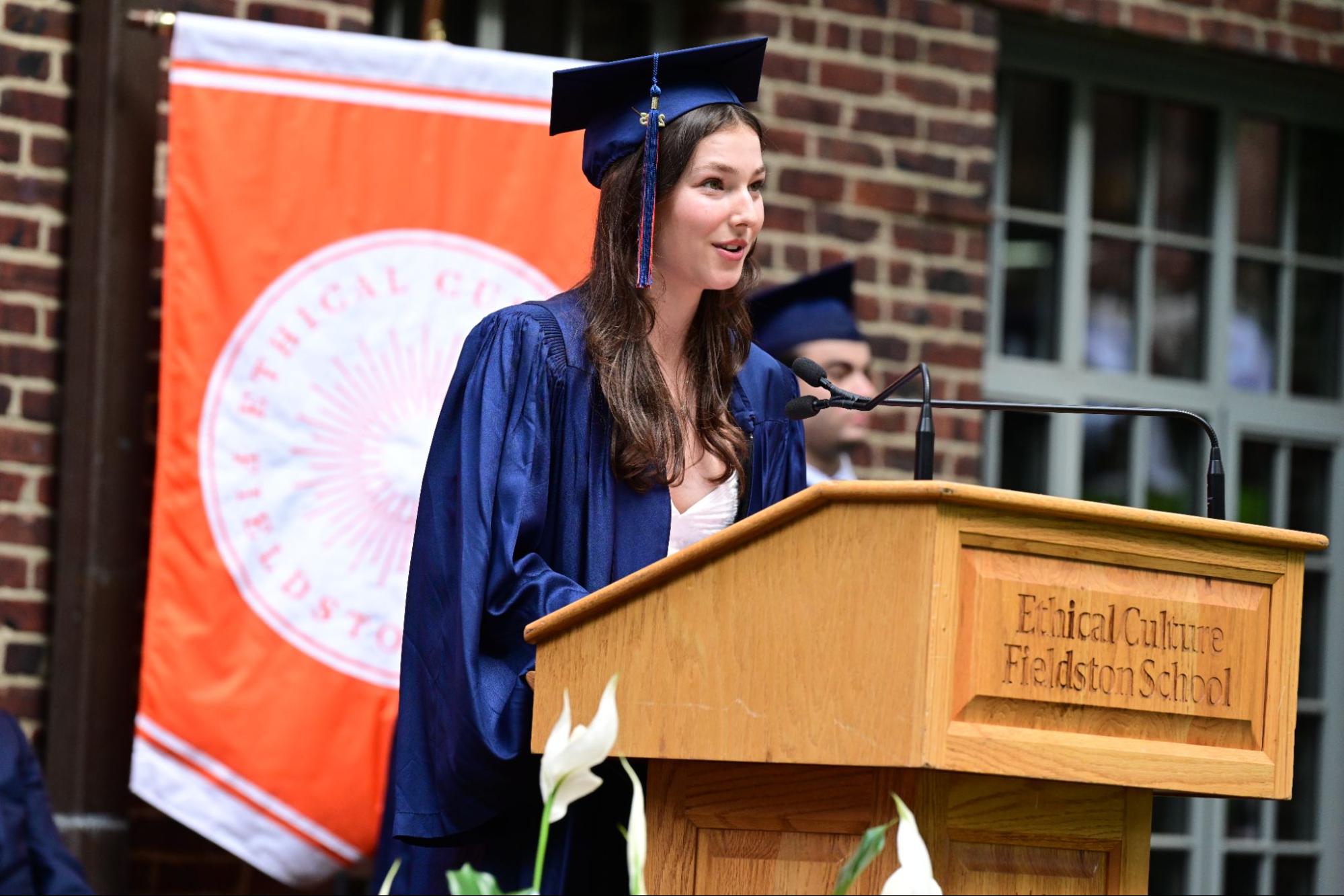
There’s one last piece to our mosaic that cannot go unacknowledged. It’s the people who have helped us form it.
While we may stand before you polished and accomplished now, our families will tell you that it wasn’t always a straight line to get to this point. Growing up isn’t easy; there were hard moments when our families scraped us up off the floor: when we missed our friends so deeply during COVID, when we didn’t make the team, when we didn’t get the grade no matter how hard we tried. Our families always told us we could — they told us that our mosaics didn’t have to be polished in order for them to be beautiful. We want to thank you for believing in us, and picking this supportive community for us to grow in when we were too young to know any better.
Our teachers have guided us in our most difficult moments, celebrated us in our best, and inspired us. I asked the senior class if they could thank one teacher for anything, who it would be and why. I received an overwhelming number of responses, which is a testament to how impactful each and every Fieldston teacher is. It was impossible to include every teacher mentioned, but here are just a few examples that represent our appreciation. On behalf of the Class of 2025, “thank you Ms. Hanson for teaching us to be curious, thank you Mr. Waldman for sharing your passion with us and your commitment to us, thank you Mr. Montera for your contagious energy and stories, thank you Ms. Paterson for telling us that it will all be okay, thank you Dr. Church for the waffle parties, never taking yourself too seriously” and personally from me, thank you for sending the school psychologist, Dr. Oppenheimer, to check on me when I was publicly crying on the quad.
I closed my 5th Grade yearbook entry by bidding my farewell to Ethical Culture. I wrote: “Being at Ethical Culture has been such an amazing journey. Ethical Culture is a fantastic school that teaches kids much more than how to do math and to write with expression. It shapes them into better people. Ethical Culture has shaped me into a smart, ethical person. Thank you Ethical Culture for giving me such a great gift, the gift of education.”
I must say, I was an incredibly insightful 5th Grader! I recognized something about Fieldston that is confirmed every day I spend on this campus. Beyond the classroom, it’s taught me how to view the world, take on hard challenges, grow from them, and thank the people who got us there. Our mosaic will expand and become more complex as we grow older, but they will still embody Fieldston values and experiences at their core. As we venture off into different states and countries as graduates, we will still be the 4th Graders who rehearsed and performed the 50 states song and the 7th Graders who memorized the world map.
Everything we, the Class of 2025, will become, is built on the foundation of what we learned climbing those worn white marble steps at Ethical Culture where so many little feet had stepped before us, on this beautiful Quad, where we’ve spent countless hours just sitting and enjoying each other’s company (listening to music on our contraband speakers), and in these historic classrooms, which have watched us grow into who we are proud to be today.
Thank you again, teachers and families. And most importantly, congratulations, Class of 2025. I can’t wait to see how our mosaics develop as we conquer this next chapter of our lives.
Alkis Karmpaliotis
Friends, families, guests, administrators, and Class of 2025 — It is an honor and privilege to be standing here today before you all. Thank you to all our wonderful faculty and staff for rigging the speaker election so I could be here.
I want to give a shout out to all the parents here today, to whom we owe a big chunk of our journey, as well as the Facilities team who made this event happen and keep our school running smoothly every day.
Over the last few weeks, I’ve had the opportunity to do a lot of reflecting. On myself, on this class, on who we’ve been, who we are, and who we might one day become. It all started a few weeks ago, when we opened the letters we had written as freshmen to our senior selves.
For a moment, the whole campus went still. Some people cried, others softly cringed. Some sat with friends and read aloud. When I read mine, I’ll be honest — it was a little painful. But that discomfort that I felt while coming face to face with my past self quickly gave way to perspective. On how far I and we have all come.
I’ve been many different people at Fieldston, from the shy new kid to the stressed-out high schooler to the lazy senior. Perhaps you all have similar stories. Versions of yourself that you think back to and cringe. Episodes of your life that you simply cannot believe happened. And, let’s be honest — we’ve all uttered the words “I cannot wait to graduate” at least once, or twice… or a hundred times.
Yet, here we are. And as I look out at all of you, what strikes me most isn’t the accolades and accomplishments — though there are many to speak of. It’s the way we’ve grown, found ourselves, and brought that growth to life alongside one another.
Our incredible production of “Pippin” featured 16 seniors, some of whom began their Fieldston careers as shy ensemble members in “Chicago” just four years ago, others as far back as the Ethical Culture “Seussical,” as little kids in oversized costumes only just learning to memorize lines.
Our athletes, many of whom started their journeys on the JV bench, have, after years of hard work and development, led our teams to championships in field hockey and basketball and baseball, not to mention some incredible playoff runs in lacrosse and soccer.
Even our student government defeated the “FSG does nothing” allegations by planning a beautiful senior sunrise for us all to enjoy. (Now, most of us didn’t make it in time to actually catch the sunrise…but that’s besides the point.)
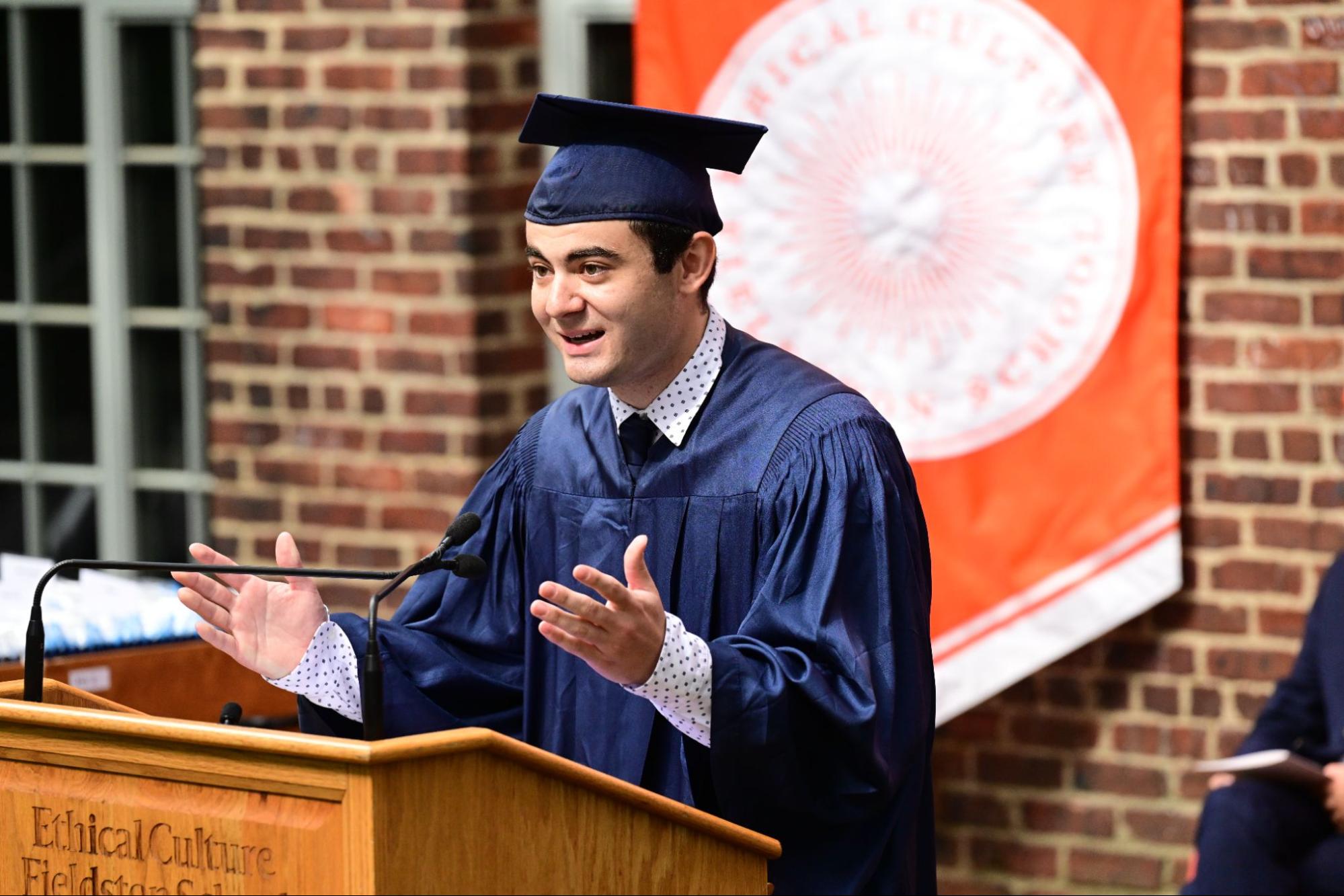
And it’s from these stories of growth and transformation that I’ve learned my biggest lessons — from the examples you set every day. To embrace failure and criticism and use them as stepping stones to something better. To be open-minded and learn from others, even — especially — when they don’t agree with you. To lead with empathy and speak with courage.
That no one is perfect. And that to burden yourself with the idea of perfection is to set yourself up for disappointment. So the best we can do is accept our imperfections, and keep showing up anyways. Trying each day to be a little better than we were the day before.
That’s what Fieldston has taught me.
Now, I won’t lie to you. I sometimes question if I’m really ready to leave this place, and I imagine many of you feel the same way. With college come new expectations, new unknowns. And, after all, it’s not just our families at home that we’re saying goodbye to. We’re also leaving behind another family right here.
For over a decade, I’ve walked these halls, crossed this quad, and sat in these classrooms. What will I do without the late nights playing GeoGuessr instead of studying for tests? Thursday mornings without falling asleep at assembly only to have my phone taken by Ms. Moreno? An inbox devoid of emails from Sandra Wang about lost items and attendance? Or that uniquely “Fieldston” feeling of walking into school at 8:00am, on four hours of sleep, only to be jolted awake by Morris Ervin leading us in a motivational chant? The truth is, I don’t have the answer.
But if there’s one thing I take with me from Fieldston, it’s that you don’t always need to have all the answers. To have doubt, to be imperfect, is to be alive.
So I’ll leave you with this: If you had to write another letter right now to your future self, four years, ten years, twenty years from now, what would it say? In other words: who are you now, and who might you become tomorrow?
That question is not meant to burden you with rigid expectations. In fact, it’s quite the opposite. It’s an invitation to get excited about your future, and remind you that the goal isn’t perfection, but continual evolution.
To be a work-in-progress, even if, at times, you don’t know where the road ahead is leading you, means you’ll always have somewhere to go and something to live for. So, take a breath, relax, celebrate this incredible milestone, embrace the uncertainty that lies ahead, while remembering always that true joy and purpose are found in the journey.
Because if you do that, you’ll become one day the person who will look back on today’s ceremony, just as you looked back at your cringey freshman self a few weeks ago, and whisper those powerful, life-defining words: “Wow, how much I’ve grown.”
Class of 2025…Fieldston…you have been my home for most of my life. And, wherever I go, wherever my journey takes me, I’ll always carry you with me in my heart and consider myself lucky to have called you my family. The best family a young man could ever ask for. Thank you.
Kenneth I. Chenault
Thank you, Kyle, for that generous introduction. To the educators and staff here today, thank you for your dedication to these young minds. To the parents and families who have nurtured and sustained, who have worried and celebrated – this day belongs to you almost as much as to the graduates.
And to the Fieldston Class of 2025: Congratulations!
It is special for my family and me to be back at Fieldston. My wife Kathryn and I are grateful for the education that our two sons, Kenneth and Kevin, Classes of 2008 and 2010, respectively, received at Fieldston.
Looking at you today, I’m reminded of my own graduation, though the calendar insists it was more than five decades ago. When I graduated high school in 1969, the nation was in flux – as it is again today.
We had the civil rights movement, the Vietnam War protests, the assassinations of Martin Luther King and RFK. You’ve had a global pandemic, sharp political divisions, technological revolution – with AI being the most transformational technology since the internet.
During such times of uncertainty and change, we search for direction. But we don’t graduate from high school with our life’s compass fully calibrated. We adjust it as we go, correcting course through experiences both planned and unexpected.
My own course needed significant correction. When I was a sophomore in high school, I brought home yet another report card that made my parents unhappy. It was a mixed bag of two A’s, three C’s, and a well-earned D in Latin. My teachers emphasized to my parents that while I had the potential to excel in school, I was an “undisciplined and frustrating” student.
I winced at those words because they captured exactly who I was. I cared deeply about some subjects and barely showed up for others. I could discuss Ellison’s “Invisible Man” and Tolkien’s “Fellowship of the Ring” trilogy with passion while my Latin homework remained untouched.
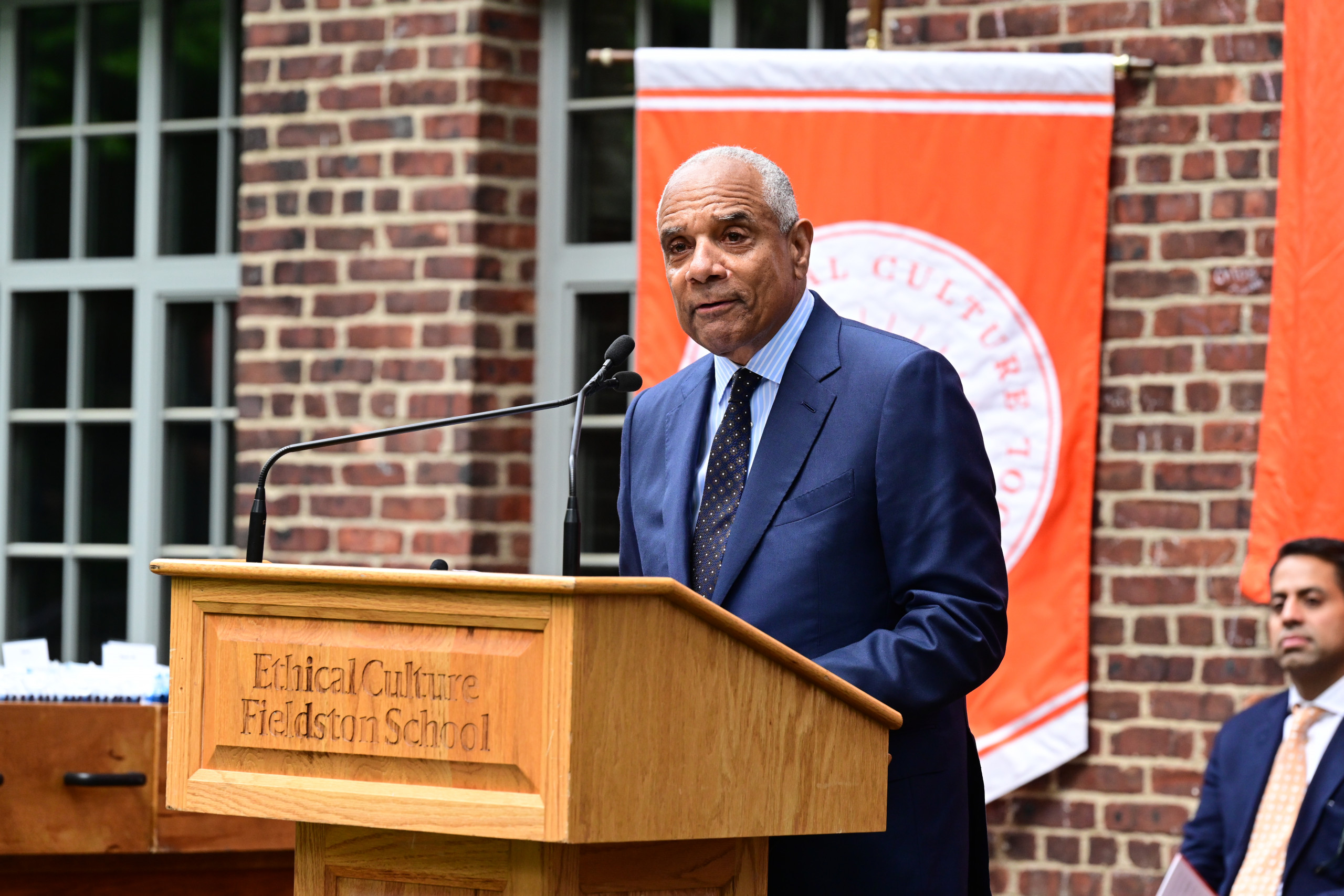
If you had suggested to me when I graduated from high school that one day I would become CEO of a Fortune 100 company, I would have laughed.
Business simply wasn’t on my radar. I wanted to join the civil rights movement, perhaps work in politics. I was drawn to the moral issues of my time, and the struggle for racial and social justice and equality. Corporate strategy? Finance? Big business? They belonged to someone else’s future, not mine.
What I couldn’t see then was how my scattered interests and undisciplined approach were limiting my potential. My Head of School, Peter Curran, became increasingly concerned about my uneven academic performance and summoned me to his office. “Ken,” he said simply, “I think you’re very intelligent, and I believe you have great potential.”
Then he lowered the boom and said the words that would echo throughout my life: “Potential gets wasted on most people. You need to decide whether you’re going to start to realize your potential.”
I must admit, that conversation didn’t change me overnight, but it forced me to grapple with a question I ask you all to consider today, as you graduate Fieldston: What will you do with what you’ve been given?
Often, it’s the simple moments that provide an answer to that question. Two such moments have stayed with me.
The first occurred right here at Fieldston, during your once-famous Fieldston Relays – a tradition that gathered private schools from across the New York area for a track and field competition.
I came with my team from the Waldorf School in Garden City, Long Island, a small school where our entire high school numbered just over 100 students. I was the first leg of our relay team. Just before the race, as tension mounted, a Fieldston runner approached me. While a competitor from another school had been taunting us, this young man simply extended his hand and said, “Good luck.”
That small gesture – a moment of grace when competition might have demanded less – stayed with me. It wasn’t grand or performative. It required no special talent, just a recognition that winning and excellence need not come at the expense of dignity – neither your own, nor that of others.
By the way, the Fieldston relays had a happy ending that year, at least for me: our team won.
The second illuminating moment took place the summer after my high school graduation, when I worked as an assistant cook at a camp in New Hampshire.
My boss was a remarkable Black woman from the South who woke me at 5:30 each morning. I peeled potatoes and plucked blueberries one by one as she reminded me everyday: “If you don’t do this, the meal doesn’t get served.”
What seemed like tedious work became a lesson in responsibility and service. The little things matter. What you do – however modest the task – affects others. Excellence is a habit expressed in everyday actions.
These experiences began forming my understanding of leadership. Not leadership as position or power, but leadership as responsibility and service.
Many years later, when my wife Kathy and I were choosing a school for our sons, we visited a range of schools. When Kathy returned from Fieldston, something distinct had captured her attention. “Of all the schools,” she said, “when I looked in the classrooms, the kids seemed happy.”
That observation proved decisive. We wanted our sons to love learning, to develop confidence, and to find joy in service to others. And we sensed that Fieldston shared these values.
What connects these moments – a headmaster’s challenge, a competitor’s sportsmanship, a cook’s insistence on responsibility, and my wife’s perception of joy in these very halls? They are compass points that have guided me through uncertainty.
I’ve come to believe that all meaningful contribution, all true leadership, requires both inner direction and outward awareness. Know what matters to you, and care about what matters to others.
My favorite definition of leadership comes from Napoleon. I always add that I don’t wish to share his fate, but his insight was profound: “The role of a leader is to define reality and give hope.” To me, that is the most simple and best definition of leadership.
I think about this quote every day, it has become my leadership mantra, and it has guided me through crises in business and life.
But here’s what I’ve also learned that might surprise you: The world’s most pressing challenges don’t need people obsessed with leadership as a goal. They need people committed to service as a way of life. I believe that if you want to lead, you have to be willing to serve.
If you want to lead, you have to be willing to serve – and that’s something too many people in positions of power today have forgotten. True leadership isn’t granted by title or acquired through ambition; it’s earned through service that places others’ needs above your own.
The world awaiting you is indeed uncertain. The questions facing your generation are profound. But uncertainty is not the enemy of accomplishment – it’s the context in which character reveals itself.
As you leave Fieldston, I hope you’ll carry with you both the confidence to follow your inner compass and the humility to extend your hand to others.
Whether you go to college, take a gap year, or play a professional sport, I hope you find a place where you explore ideas and develop a core set of values and beliefs that bring you alive.
May you discover purpose in service. And may you learn to lead in life, not because you seek leadership as a position, but because your character and commitments naturally inspire others to join you in creating a more just and joyful world.
Congratulations, Class of 2025. I can’t wait to see where your compass guides you next.
